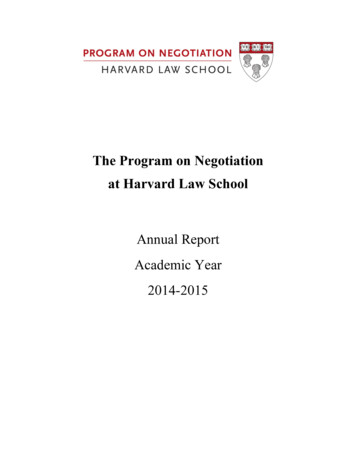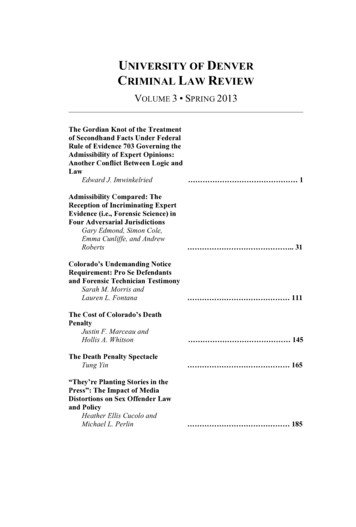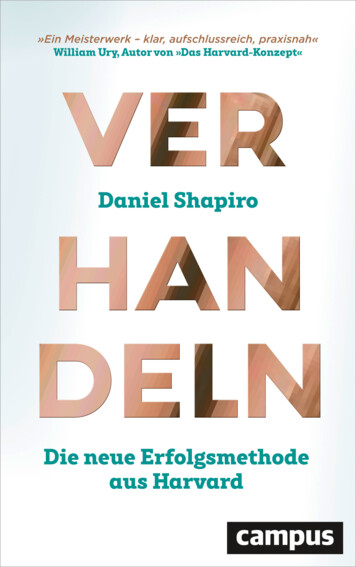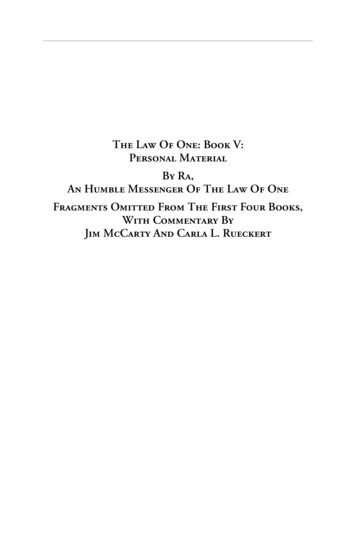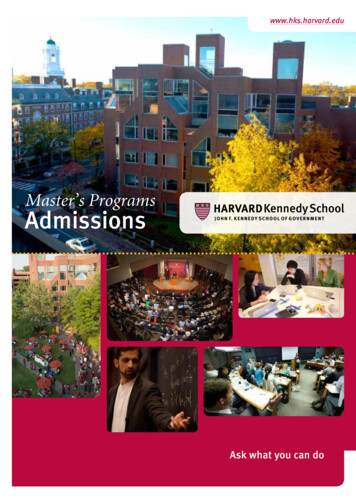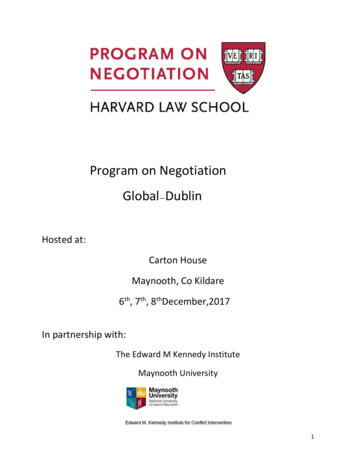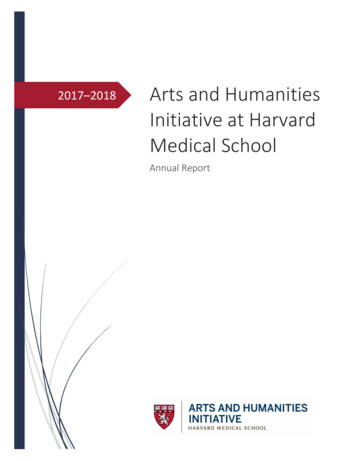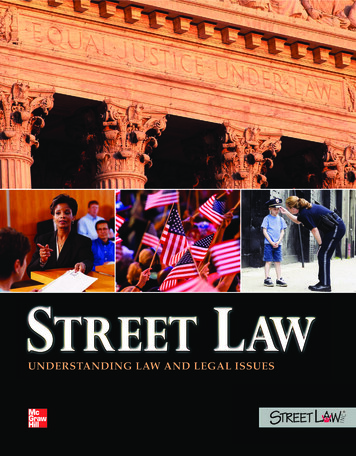
Transcription
the free sea
natural law andenlightenment classicsKnud HaakonssenGeneral Editor
Hugo Grotius
[2-page spread for map]The Far East
uuuuuuuuuuuuuuuuuuuuuiiiiiiiinatural law andiienlightenment classicsiiiiiiiiiiiiiiiiiiHugo GrotiusiiiiiiiiiiiiiiTranslated by Richard Hakluytiiwith William Welwod’s Critiqueiiiiand Grotius’s ReplyiiiiEdited and with an Introductioniiby David ArmitageiiiiMajor Legal and Political Works of Hugo Grotiusiiiiiiiiiiiiiiliberty fundiiIndianapolisiiiiiiuuuuuuuuuuuuuuuuuuuuuThe Free Sea
This book is published by Liberty Fund, Inc., a foundation establishedto encourage study of the ideal of a society of free and responsible individuals.The cuneiform inscription that serves as our logo and as the design motif forour endpapers is the earliest-known written appearance of the word“freedom” (amagi), or “liberty.” It is taken from a clay document writtenabout 2300 b.c. in the Sumerian city-state of Lagash.䉷 2004 Liberty Fund, Inc.All rights reservedPrinted in the United States of America08 07 06 05 04 c08 07 06 05 04 p5 4 3 2 15 4 3 2 1Frontispiece: Portrait of Hugo de Groot by Michiel van Mierevelt, 1608;oil on panel; collection of Historical Museum Rotterdam, on loan from theVan der Mandele Stichting. Reproduced by permission.Map of the Far East on pp. iv–v reproduced from John Keay,The Honourable Company: A History of the East India Company,published by Harper Collins, London: 1990. Used by permission.Library of Congress Cataloging-in-Publication DataGrotius, Hugo, 1583–1645.[Mare liberum. English]The free sea / Hugo Grotius;translated by Richard Hakluyt with William Welwod’s critique and Grotius’s reply;edited and with an introduction by David Armitage.p. cm.—(Natural law and enlightenment classics)“The major legal and political works of Hugo Grotius.”Includes bibliographical references and index.isbn 0-86597-430-6 (hbk.: alk. paper)—isbn 0-86597-431-4 (pbk.: alk. paper)1. Freedom of the seas. I. Hakluyt, Richard, 1552?–1616.II. Welwod, William, fl. 1578–1622.III. Armitage, David, 1965– IV. Title. V. Series.KZA1348.G7613 2004343.09 6—dc222003060575liberty fund, inc.8335 Allison Pointe Trail, Suite 300Indianapolis, Indiana 46250–1684
contentsIntroductionxiA Note on the TextsxxiAcknowledgmentsxxvhugo grotius, the free sea1William Welwod, “Of the Communityand Propriety of the Seas”63Hugo Grotius, “Defense of Chapter Vof the Mare Liberum”75BibliographyWorks of Hugo Grotius131Other Works Referred to in the Text and Notes132Index137
introductionFew works of such brevity can have caused arguments of such global extentand striking longevity as Hugo Grotius’s Mare Liberum (The Free Sea).The book first appeared in Leiden as a pocket-sized quarto volume fromthe famous publishing house of Elzevier in the spring of 1609. The publication was anonymous, perhaps because (as Grotius later wrote) “itseemed to me to be safe, like a painter skulking behind his easel, to findout the judgment of others and to consider more carefully anything thatmight be published to the contrary” (Defense, p. 78, below). Grotius wasonly in his late twenties but already possessed a reputation as one of Europe’s most precocious and penetrating humanist scholars. Though selftaught as a lawyer, his reputation as an advocate and adviser was growing,along with his political influence. By publishing Mare Liberum, he wasdisplaying the literary, rhetorical, and philosophical talents that had wonhim his burgeoning fame and respect, and he was also intervening in twopolitical debates of pivotal significance for his own country. The first wasthe relationship between the United Provinces and the Spanish monarchy,from which the Dutch had broken away in 1581; the second was the Dutchright to commercial penetration in Southeast Asia. Although the arena ofdispute was local, the implications of Mare Liberum’s arguments wereglobal. The book was taken by the English and the Scots as an assault ontheir fishing rights in the North Sea and by the Spanish as an attack onthe foundations of their overseas empire. It had implications no less forcoastal waters than it did for the high seas, for the West Indies as much asfor the East Indies, and for intra-European disputes as well as for relationsbetween the European powers and extra-European peoples.The immediate context for the publication of Mare Liberum was theprocess of negotiating a truce between the Dutch and the Spanish to endxi
xiiintroductionthe decades of contention that had begun with the Dutch revolt of the latesixteenth century.1 Among the issues on the table during these discussionswas the question of Dutch access to the expanding markets of the East Indies, where the Dutch were engaged in cut-throat competition with thePortuguese, the Spanish, and, increasingly, the English for the huge profitsto be gained from trade in silks, spices, porcelain, and other luxury goods.This was, of course, no novel dispute in 1609, but the process of drawingup a definitive truce between the Dutch and the Spanish had brought matters to a head, not least for the Dutch East India Company (VOC). Indeed, it was at the insistence of the Zeeland Chamber of the VOC in theautumn of 1608 that Grotius prepared Mare Liberum for publication, justas it had been at the VOC’s behest that he had originally written it as partof a larger work in 1604.2The original occasion for the composition of the text that would latercomprise Mare Liberum had been the major international dispute occasioned by the Dutch seizure of a Portuguese vessel in the Straits of Singapore in February 1603.3 On that occasion, the Dutch captain Jakob vanHeemskerck had captured the carrack Sta. Catarina, which was carrying afabulously wealthy cargo of trade goods. When its contents were sold inAmsterdam, they grossed more than three million guilders, a sum equivalent to just less than the annual revenue of the English government at thetime and more than double the capital of the English East India Company.4 A prize of such magnitude generated an equally prominent debate1. Martine van Ittersum, “Profit and Principle: Hugo Grotius, Natural Rights Theories and the Rise of Dutch Power in the East Indies, 1595–1615” (Ph.D. dissertation,Harvard University, 2002), 442–53.2. For correspondence from November 1608 to [April] 1609 relating to the publication of Mare Liberum, see Briefwisseling van Hugo Grotius, ed. P. C. Molhuysen, B. L.Meulenbroek, and H. J. M. Nellen, 17 vols. (The Hague: M. Nijhoff, 1928–2001), I,128–34, 139–41, 144–45.3. Peter Borschberg, “The Seizure of the Sta. Catarina Revisited: The PortugueseEmpire in Asia, VOC Politics and the Origins of the Dutch-Johor Alliance (1602–ca. 1616),” Journal of Southeast Asian Studies 33 (2002): 31–62.4. Richard Tuck, The Rights of War and Peace: Political Thought and the InternationalOrder from Grotius to Kant (Oxford: Oxford University Press, 1999), 80; Borschberg,“The Seizure of the Sta. Catarina Revisited”: 35.
introductionxiiiabout the legitimacy of the Dutch capture of a Portuguese vessel in thedistant seas of the East Indies. The twenty-one-year-old Grotius wasdrafted to supply a defense of the VOC’s position that the ship had beentaken as booty in a just war: As he recalled later, “The universal laws of warand prize (universi belli praedaeque jura), and the story of the dire andcruel deeds perpetrated by the Portuguese upon our fellow-countrymen,and many other things pertaining to this subject, I treated in a rather longCommentary which up to the present I have refrained from publishing”(Defense, p. 77, below). The manuscript of that commentary remained unknown to posterity until it resurfaced at a sale of de Groot family papersin 1864. Its discovery revealed that Mare Liberum was substantially identical to the twelfth chapter of the work usually referred to by Grotius himself as De rebus Indicis (On the Affairs of the Indies),5 though better knownby the title given to it by its first editor, De Jure Praedae Commentarius(Commentary on the Law of Prize and Booty).6Although Mare Liberum’s influence and importance were—and remain—independent of that larger commentary, they cannot be fully understood outside of the argument of which they formed a part. Grotiusdefended the Dutch seizure of the Sta. Catarina on the basis of a set ofnatural laws, which he derived originally from the divine will.7 The twoprimary laws of nature were self-defense and self-preservation. He definedself-preservation as acquiring and retaining anything useful for life, a process which assumed that God had bestowed the gifts of his creation uponall human beings collectively but on none particularly: Only throughphysical seizure (possessio) leading to use (usus) could ownership (dominium) be derived. Two further laws, of inoffensiveness (harm no one) andabstinence (do not seize the possessions of others), set limits to these pri-5. For example, Briefwisseling van Hugo Grotius, ed. Molhuysen, Meulenbroek, andNellen, I, 72 (“de rebus Indicis opusculum”).6. Hugo Grotius, De Jure Praedae Commentarius, ed. H. G. Hamaker (The Hague:M. Nijhoff, 1868); Grotius, De Jure Praedae Commentarius, 2 vols. (Oxford: OxfordUniversity Press, 1950). All references in the text are to the translation in the first volume of the latter edition.7. Richard Tuck, Philosophy and Government, 1572–1651 (Cambridge: CambridgeUniversity Press, 1993), 169–79.
xivintroductionmary laws; from these followed two further laws of justice: that evil deedsshould be punished and that good deeds should be rewarded (De JurePraedae, pp. 8, 10, 11, 13, 15). Together, these laws provided the basis forGrotius’s judgment of the facts of Luso-Dutch relations in the East Indies.If it could be shown that the Portuguese had committed evil deeds againstthe Dutch and against their indigenous allies, and if it could be shown thatvan Heemskerck had engaged in a just war against the Portuguese captainof the Sta. Catarina, then his spoils taken in that war would be a legitimateprize for the corporate body on whose behalf he acted, the VOC itself.The bulk of Grotius’s argument turned on the two issues of law andfact. In the first third of De Jure Praedae, he laid out the conditions underwhich booty might be justly seized by Christians from other Christiansand the broader circumstances that defined a war between Christians asjust. Having established the terms of law, he turned to matters of fact in adetailed narrative of relations since the Dutch revolt between the Dutchon one side and the Spanish and Portuguese on the other, to show that“[t]he latter . . . have invariably set an example of perfidy and cruelty; theDutch, an example of clemency and good faith” (De Jure Praedae, p. 171).Then, in the twelfth chapter of his defense, Grotius went on to argue“that even if the war were a private war, it would be just, and the prizewould be justly acquired by the Dutch East India Company” (De JurePraedae, p. 216).When Grotius came to publish that chapter as Mare Liberum, he madeno reference to the case of the Sta. Catarina or to the supposed facts ofPortuguese aggression and depredation in the East Indies. Instead, he prefaced his argument with a refutation of skepticism about the natural basisof moral distinctions (The Free Sea, pp. 5–6, below). Against the instrumentalist view that such distinctions had been invented solely to benefitthe powerful in their rule over the powerless, Grotius affirmed that thelaws of nature are the product of divine will and that they can be universally understood by the application of natural reason. He again argued thatGod had created the world in common for all humanity but that propertycould be acquired through human “labor and industry,” subject to two ofthe primary natural laws he had set down in De Jure Praedae: “that allsurely might use common things without the damage of all and, for the
introductionxvrest, every man contented with his portion shall abstain from another’s”(The Free Sea, p. 6, below).Freedom of navigation and trade (commeandi commercandique libertas)exemplified those principles, whether applied to particular communitiesor to the universal society of humanity. To support this contention, Grotius appealed to Greek and Roman literature, to Roman law (in particular,to Institutes, II. 1. 1 and Digest, I. 8. 4), and to sixteenth-century Spanishauthorities, above all the Dominican theologian Francisco de Vitoria andhis fellow Salamancan, the jurist Fernando Vázquez de Menchaca. A notable omission from his battery of authorities was Scripture, a resource thatGrotius’s Scottish antagonist, William Welwod, would later exploit. However, by framing his argument in this way, Grotius could illustrate the obligations of natural (rather than revealed) religion, beyond the interpretivetraditions of particular denominations, and show that even the juristic traditions of the Spanish monarchy (which since 1580 had included Portugal)opposed the Portuguese. His broader framing of the argument also ensured that Mare Liberum would be understood as a general statement ofthe right to freedom of trade and navigation. In this way, it sparked a widerand more enduring controversy regarding the foundations of internationalrelations, the limits of national sovereignty, and the relationship betweensovereignty (imperium) and possession (dominium) that would guaranteeits lasting fame and notoriety.Grotius broke down the Portuguese claim of exclusive access to the EastIndies into three constituent parts: the right of possession, the right of navigation, and the right of trade. The Portuguese could claim no right ofpossession by virtue of first discovery, because the lands of the East Indieswere not terra nullius (unpossessed land) but were in the possession oftheir native rulers. The fact that those rulers were “partly idolaters, partlyMahometans” did not invalidate their right to dominion (The Free Sea,p. 14, below): As Aquinas and Vitoria had argued (against earlier thinkerslike Hostiensis and John Wycliffe), grace could not confer dominion. Norwere the peoples of Southeast Asia “out of their wits and insensible butingenious and sharp-witted.” No assumptions of tutelage, or even appealsto Aristotelian conceptions of natural servitude, could therefore be employed to dispossess them, as Vitoria had likewise argued against the use
xviintroductionof such arguments in the Americas (The Free Sea, p. 15, below). Papal donation could not have transferred dominium to the Portuguese because thepope possessed no temporal power, least of all over infidels (as, yet again,Vitoria had argued in relation to the New World). The only possible remaining claim was by “right of prey” (jure praedae) or conquest; however,that too was inapplicable to the Portuguese case, because the indigenouspeoples had supplied no casus belli on which a claim to conquest in a justwar could have been founded. With this reprise of four centuries of European arguments regarding the dispossession of the “barbarian,” Grotiusleft the Portuguese with no legitimate argument for possession. He thenturned to their arguments for exclusive navigation and commerce.Only at this point did Grotius directly address the subject of his title(Mare Liberum, The Free Sea) rather than his subtitle (De Jure quod BatavisCompetit ad Indicana Commercio, The Right Which the Hollanders Oughtto Have to the Indian Merchandise for Trading), as his argument shiftedfrom rights over land to those over the sea. This distinction between territorial and maritime possession rested on a yet more fundamental difference between those things that could be appropriated and those that remained common by nature. If (as Grotius had argued in the body of DeJure Praedae) dominium could be derived only from use based on physicalapprehension (possessio), only those things capable both of possession andof use could be appropriated from their pristine state of natural community, subject to the proviso that no other person should be harmed by theact of appropriation (an important limiting factor that permitted the private appropriation of the seashore but not at the expense of common access or use). On these grounds, Grotius argued that neither the Portuguesenor anyone else could claim exclusive possession of the ocean around andleading to the East Indies. Because the sea is fluid and ever changing, itcannot be possessed; because it (and its resources, such as fish) is apparently inexhaustible, it cannot be used: “[t]he sea therefore is in the numberof things which are not in merchandise and trading, that is to say, cannotremain proper” (The Free Sea, p. 30, below). The land, by contrast, can bephysically circumscribed, human labor does transform it, and its productsare rendered private by their use. This fundamental contrast between the
introductionxviiproperties of sea and land would remain central to later conceptions ofproperty within the natural-law tradition up to and beyond John Locke’sagriculturalist argument for appropriation, which similarly exempted “theOcean, that great and still remaining Common of Mankind” (Locke, Second Treatise, § 30) from the possibility of exclusive possession.8Yet if the Portuguese could claim no right of possession (dominium)over the sea, the question remained whether they could still claim jurisdiction (imperium), which would allow them to debar others from tradewith the East Indies. In the last part of the work, Grotius rebutted Portuguese claims to exclusive rights of trade. He argued that the right of navigation could not be appropriated by the Portuguese or anyone else (including the pope). Because that right of navigation was an objectivefeature of natural law, it could not be altered by human custom or by prescription, as Grotius showed with extensive quotations from Vázquez deMenchaca (a proponent of the freedom of the seas, to be sure, but also anexponent of the idea that navigation was not only unnatural but also suicidally dangerous, a feature of Vázquez’s argument Grotius convenientlyignored).9 As with the right of navigation, so with the right of trading,which was also “agreeable to the primary law of nations” (The Free Sea,p. 51, below). After this point, Grotius added a new conclusion to the material he had drawn from De Jure Praedae, arguing that “we wholly maintain that liberty which we have by nature, whether we have peace, truce orwar with the Spaniard,” but with the threat attached that “he that shallstop the passage and hinder the carrying out of merchandise may be resisted by way of fact, as they say, even without expecting any public authority” (The Free Sea, p. 60, below).The Twelve Years’ Truce between the Dutch republic and the Spanishmonarchy was soon ratified, but Mare Liberum’s relevance was not dimin8. John Locke, Two Treatises of Government, ed. Peter Laslett (Cambridge: Cambridge University Press, 1988), 289. Locke possessed Grotius, “De mari libero,” in hiscopy of the 1680 Hague edition of De Jure Belli ac Pacis: John Harrison and Peter Laslett, The Library of John Locke (Oxford: Oxford University Press, 1965), item 1331.9. Fernando Vázquez de Menchaca, Controversiarum illustrium . . . libri tres (Frankfurt, 1572), II. 20. 11–20.
xviiiintroductionished. Grotius’s arguments could still justify the VOC’s encroachment onthe Portuguese colonial empire, despite the armistice in Europe; and theirapplicability to other contemporary disputes regarding the freedom of navigation, trade, and fishing made Mare Liberum a shot heard around theworld. Its rebuttal of papal claims ensured that it was rapidly placed on theChurch’s Index of prohibited books in January 1610.10 Sophisticated andextensive responses also came from the jurists William Welwod in Scotland (An Abridgement of All Sea-Lawes [1613]; De Dominio Maris [1615]),John Selden in England (Mare Clausum [ca. 1618]), Justo Seraphim deFreitas in Portugal (De Justo Imperio Lusitanorum Asiatico [1625]), andJuan Solórzano Pereira in Spain (De Indiarum Jure [1629]).The only response to which Grotius replied was Welwod’s Abridgement.Grotius had been shown Welwod’s book in 1613, when he was in Londonas a delegate to the Anglo-Dutch colonial conference, and he took it to be“exemplar Servi Maris” (“the pattern of the unfree sea”).11 Welwod had understood Mare Liberum’s alleged East Indian context as a cover for thework’s real purpose: to reinforce the claims of the Dutch herring-fleets tofish in British (in particular, Scottish) territorial waters. Those claims wereindeed a topic of much contention after 1610, and Welwod could be forgiven for suspecting Mare Liberum’s contingent applicability. Yet Welwodstressed only the argument about fishing, ignored the broader questions oftrade and navigation, and concentrated his fire on the fifth chapter of MareLiberum alone. Like Grotius, he argued from the precedents of Romanlaw, but he also appealed to Scripture to argue that the sea could be occupied and hence acquired as the basis for customary claims to exclusivenational rights over territorial waters. However, Welwod excepted the highseas from such claims to exclusive possession and agreed with Grotius thatthey should remain “mare vastum liberrimum” (“the great and most freesea”: Welwod, “Of the Community and Propriety of the Seas,” p. 74, below). That major concession was not enough to secure Grotius’s assent to10. Franz Heinrich Reusch, Der Index der verbotenen Bücher, 2 vols. (Bonn: M. Cohen and Son, 1883–85), II, 102.11. Grotius to Johan Boreel, 5 May 1614 (O.S.), Briefwisseling van Hugo Grotius, ed.Molhuysen, Meulenbroek, and Nellen, XVII, 111.
introductionxixWelwod’s arguments, to which he replied at length in the unpublished Defensio capitis quinti Maris Liberi (Defense of the Fifth Chapter of “Mare Liberum”) (ca. 1615).12In the Defense of . . . “Mare Liberum,” Grotius insisted even more firmlythat land and sea were incommensurable because the one can be appropriated and the other cannot. He had to do so not least to refute Welwod’sscriptural argument that God had given both earth and sea to humanityin common, an assertion that encouraged Grotius to reinforce the distinction between particular appropriation and universal possession, and hencebetween those things that are (or can become) private and those that remain in common. He even went further than he had needed (or dared) inMare Liberum to argue that necessity—in the case of famine, for example—could render “common again things formerly owned” (Defense, p.86, below). To clarify his definition of community, Grotius had to distinguish it from anything public (that is, owned by a particular nation or people) on the grounds that community of property was natural, whereas anything public was civil and hence the product of human will. From this, itwas but a short step to two crucial moves that would characterize his political theory in De Jure Belli ac Pacis: first, his argument that the freedomof the seas derived not only from nature but also from custom and hencefrom consent (an anticipation of his later theory of property: De Jure Belliac Pacis, II. 2. 2, § 5); and, second, that the right (jus) to trade or navigationwas legitimate not by virtue of being a norm of objective justice but because it was “a moral faculty over a thing” (Defense, p. 107, below) (an anticipation of his highly influential theory of rights as subjective moralqualities: De Jure Belli ac Pacis, I. 1. 4).1312. Hugo Grotius, “Defensio capitis quinti Maris Liberi oppugnati a Guilielmo Welwodo . . . capite XXVII ejus libri . . . cui titulum fecit Compendium Legum Maritimarum” (ca. 1615), in Samuel Muller, Mare Clausum: Bijdrage tot de Geschiedenis derRivaliteit van Engeland en Nederland in de Zeventiende Eeuw (Amsterdam: F. Muller,1872), 331–61. This must be the “geschrift de Piscatura” (“the tract On Fishing”) referredto by Grotius in 1622: Grotius to Nicolaes van Reigersberch, 14 April 1622 (O.S.), Briefwisseling van Hugo Grotius, ed. Molhuysen, Meulenbroek, and Nellen, II, 204.13. Knud Haakonssen, “Hugo Grotius and the History of Political Thought,” Political Theory 13 (1985): 240, 242–43.
xxintroductionThe Defense, like Mare Liberum, marked a crucial stage in the development of Grotius’s mature political theory. The argument of Mare Liberum had already come back to haunt him when, as a negotiator for theDutch in fishing disputes with the English in 1613, he justified English exclusion from Dutch fishing grounds. In ignorance of the identity of thework’s author, the English envoys threw back the arguments of the “assertor Maris liberi” (the defender of the free sea) in Grotius’s own face.14 Eventhis discomfiting incident may have had a place in Grotius’s philosophicaldevelopment, as it caused him to refine the limits of his theory of propertywhile he traveled the road toward De Jure Belli ac Pacis. Indeed, by 1625he had come to agree with Welwod that territorial waters could be possessed (De Jure Belli ac Pacis, II. 3. 13–15). Yet the significance of Mare Liberum was not confined to the progress of Grotius’s own thought: Theclassic dispute between mare liberum and mare clausum (represented mostfamously by Selden’s “deeply Grotian” reply to Grotius)15 lasted for muchof the seventeenth century, flared up intermittently in the eighteenth andnineteenth, and was decided only in the twentieth.16 Anyone wanting anaccessible introduction to that epochal argument, to the genesis of moderntheories of property and sovereignty, or to Grotius’s political theory coulddo no better than begin with his compact classic, Mare Liberum.David Armitage14. English Commissioners to Dutch Commissioners, 9 May 1613 (O.S.), in G. N.Clark and W. J. M. van Eysinga, The Colonial Conferences Between England and theNetherlands in 1613 and 1615, Bibliotheca Visseriana 15 (1940), 116.15. Tuck, Philosophy and Government, 1572–1651, 213.16. Thomas Wemyss Fulton, The Sovereignty of the Sea (London: W. Blackwood,1911).
a note on the textsHugo Grotius, The Free Sea, trans. Richard HakluytThere have been only two English translations of Mare Liberum. The lastwas in 1916, as part of the series of classics in the history of internationallaw published by the Carnegie Endowment for International Peace.1 Thistranslation was avowedly a product of debates on neutral shipping duringthe First World War: “Since the month of August, 1914, the expression‘Freedom of the Seas’ has been on the lips of belligerent and neutral, andit seems as advisable as it is timely to issue—for the first time in English—the famous Latin tractate of Grotius proclaiming, explaining, and in nosmall measure making the ‘freedom of the seas.’”2 However, though theCarnegie Endowment’s edition may have been the first translation “issue[d]” in English, it was not the only, or even the first, English translation. That had been undertaken three hundred years before by the greatEnglish memorialist of overseas activity and promoter of English trade andcolonization Richard Hakluyt the younger.3The manuscript of the translation in the Inner Temple Library in London (MS Petyt 529) is a fair copy in Hakluyt’s own hand. The twenty-sixleaf quarto was originally bound in vellum, of which a small patch survives1. Hugo Grotius, The Freedom of the Seas, trans. Ralph Van Deman Magoffin (NewYork: Oxford University Press, American Branch, 1916).2. James Brown Scott, “Introductory Note,” in Grotius, The Freedom of the Seas,trans. Magoffin, p. v. The first German translation followed in 1919: Grotius, Von derFreiheit des Meeres, ed. and trans. Richard Boschan (Leipzig: F. Meiner, 1919).3. George Bruner Parks, Richard Hakluyt and the English Voyages (New York: American Geographical Society, 1928), 212–13, 257; D. B. Quinn and A. M. Quinn, “A Hakluyt Chronology,” in The Hakluyt Handbook, ed. D. B. Quinn, 2 vols. (London: Hakluyt Society, 1974), I, 324.xxi
xxiia note on the textscontaining the title “Mare liberum / The free Sea.” The flyleaf notes thatit was “Translated into English by Mr Rich: Hackluyt &c.”4 Only briefextracts from the translation have ever been printed.5 It has attracted littlecommentary from Hakluyt scholars and remains entirely unknown toscholars of Grotius, let alone to any wider readership. This edition therefore represents the first publication of an unknown contemporary translation of a major work in the history of political thought by a translator ofhistorical significance in his own right.The Free Sea was one of only three book-length translations Hakluythimself undertook. The two others—from the French and Portuguese—both appeared in print during Hakluyt’s lifetime.6 The only translationfrom the Latin—of a linguistic manual for European travelers to the EastIndies—with which his name has been associated was commissioned bythe English East India Company in 1614.7 It is unclear whether Hakluytwas responsible for the translation or was simply the agent by which itreached the company.8 It is nonetheless possible that The Free Sea was theresult of a commission from the company. The arguments of The Free Seacould just as easily have supported the English company’s claims againstthe Portuguese as the VOC’s and were, moreover, used during the AngloDutch colonial conferences of 1613 and 1615 to combat Dutch pretensionsto exclusive access to the East Indies. However, no payments to Hakluytfor a translation are recorded in the Court Books of the East India Company. Until further evidence is discovered, the occasion for his translationand the reason it was not published can only be matters for speculation.All that is certain is that the translation can have been undertaken no ear-4. Hugo Grotius, “The Free Sea,” trans. Richard Hakluyt, Inner Temple Library,MS Petyt 529, fol. 2r.5. The Original Writings and Correspondence of the Two Richard Hakluyts, ed. E. G. R.Taylor, 2 vols. (London: Hakluyt Society, 1935), II, 497–99.6. F. M. Rogers, “Hakluyt a
1. Martine van Ittersum, “Profit and Principle: Hugo Grotius, Natural Rights The-ories and the Rise of Dutch Power in the East Indies, 1595–1615” (Ph.D. dissertation, Harvard University, 2002), 442–53. 2. For correspondence
